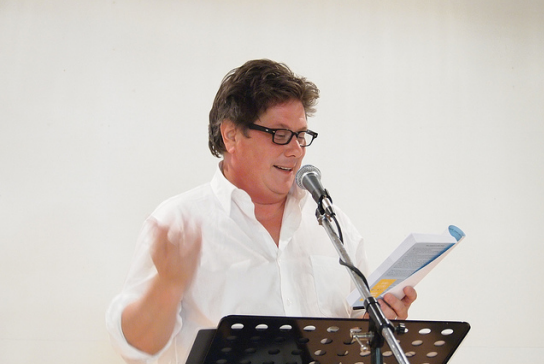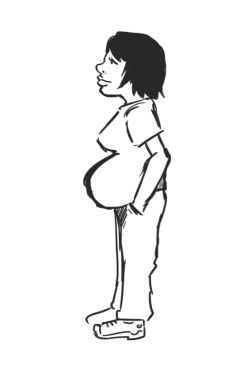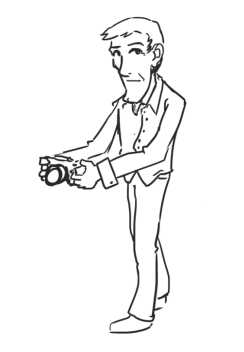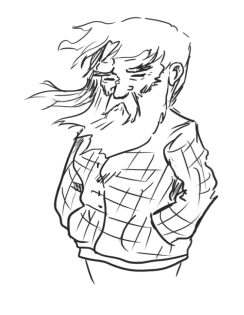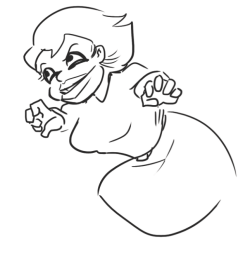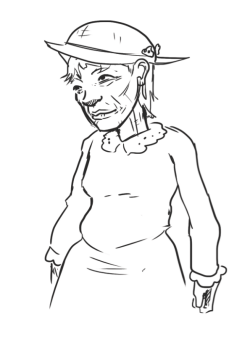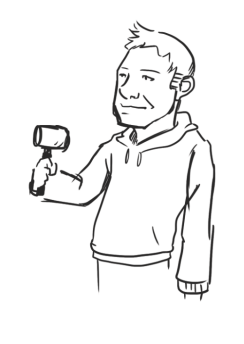Print Edition: March 13, 2013
Canadian author Andrew Kaufman published his fourth book, Born Weird, a little over three months ago. Blending the everyday a supernatural element of five siblings cursed and blessed with strange powers, Kaufman portrays a world that is both realistic and fantastic, leading the reader to examine the plusses and negatives of real life, with or without superpowers.
The question that’s been racing through my mind since I read Born Weird is that at one point Richard’s playing with his camera in the van, and his siblings kind of gang up on him and say, “You use that as a shield against the world.” He denies it and denies it, but then he realizes they’re right, and he’s been using it as a protective device.
Do you ever feel that way about your work?
Oh. Interesting. Um. Good start. I think that’s a danger. I guess I have to say yes. Sometimes it’s easier to work through issues and through emotional problems in my mind, with a fictional character. So yeah, I think you’re right – and I think before you asked me that I’ve never really had to address it.
Yeah, every book I’ve written has turned out to be something that I’m trying to work through in my own life. Maybe it’s not so much a shield – maybe it’s like homework or margin notes, where I’m kind of doing out the math. So then the idea is that I’m actually having to figure it out, and I take it out of the studio and I incorporate it into my real life.
But yeah, I think that’s a big danger, that it’s easier to be vulnerable and emotionally open to people that don’t actually exist. [laughs]
What kind of issues were you dealing with personally, if I can ask that question?
Well, that’s the funny thing about Born Weird – I really don’t know yet. This is the fourth book that I’ve written and I can tell you what the other three were about pretty openly, pretty matter-of-factly and simply. I’m still trying to figure out exactly what it was I was figuring out, that prompted me to write Born Weird.
I kind of suspect—although I don’t know for sure—that the five of the Weird siblings kind of represent a slice of my personality, something that is really hard to explain. Blursings, right? Trying to deal with the fact that every ability you have also comes with a shadow or a dark side. I am someone that doesn’t give up hope that easily, and that can lead to being in denial. I’m also someone who can rise up when confronted with a tough situation, like Kent, but then that also makes me more aggressively combative than I need to be in some places.
So I can definitely go through all of the blursings that the siblings have and find the correlation in my own personality. Everything has a downside. Every strength that you have can be a weakness as well.
What originally drew me to this book was a review that said, “Finally! A Canadian novel that isn’t bleak!”
Yeah, I read that too! A lot of the reviews have touched on the humour and the optimism and the positivity of the book. But I see this as a really sad book – there is lots of comedy, but I see the comedy just as a way of dealing with tragedy, you know? They’re all really messed up, and there are three or four scenes in a graveyard, people are dying, and they all have this huge hole in their lives. They were all blown apart when their father disappeared, and they’ve never really been able to put themselves back together.
Ultimately, it is a positive book because they do manage to put themselves back together. The positivity is that they actually manage to get to zero, right?
But I mean, it’s not As For Me and My House. There’s more joy.
To me, a lot of Canadian fiction tends to lose me when it’s all so bleak, and it’s all so dry, and it’s always so disparaging. I just feel like the whole story would include all that stuff, but even in the midst of crisis there are funny moments. There’s hope. So I think the whole story has to include both the ups and the downs. Otherwise you’re not getting it. You’re just getting the half of it.
The other interesting facet of this novel was the idea of that supernatural blursing, which is reality with a twist. I’ve been trying to place that in a genre –
And you’re failing miserably. [laughs]
I don’t know what genre it is either – it’s not completely fantasy and it’s not really science fiction. There are definitely certain conventions that all classics of Canadian literary fiction have and I don’t think I’m falling into that either. It’s a hybrid – it kind of falls between two genres, for better or worse.
What I try to do is to take the everyday, just real-life stuff, and then exaggerate it. So the idea that the grandmother gave her grandchildren a power – that’s just based on family. Who you grow up around, and who your siblings are, and what your family’s like – that shapes a lot of who you are, and it gives you plusses and minuses, and it gives you things you have to overcome. That reality, which everyone can relate to, is just sort of exaggerated to the point where it’s this supernatural gift that the grandmother gives. Uh, have you read All My Friends Are Superheroes?
No, but I read The Waterproof Bible.
Oh! Really? That’s my favourite.
Why’s that?
That book was written when I was overcoming a lot – I had some pretty major losses. So for me, I was pretty happy with all the storylines and the characters and I really loved the way it wove together. It was a challenge to keep that going and have everyone interact. Every one of those characters interacts somehow and influences the shape of the story in a way that seems completely random.
I think my favourite moment was when the boat starts leaking.
[deliberately] Now, I think that is – I mean, there is a beautiful moment in life, in anything. It’s the same thing with the Weirds, when you have people who are pretty hard on each other, and full of conflict, and then comes a moment when all that bullshit that you use to keep yourself from each other just goes away, and everybody has to start working together. I think it’s true but kind of sad that it takes some sort of great crisis before that happens.
And that’s why I wrote that scene where the boat starts leaking, and then all of a sudden everyone has to start working together.
I love those moments in life, too, where something happens that unites everybody – and it can be as simple as the rain sometimes, like when you’re at a bus stop and it’s raining and all of a sudden everybody crowds together. In Toronto a couple weeks ago, we had a snowstorm, and people were walking on the streets, pushing strangers’ cars out of snowbanks and stuff. It’s just wonderful to see that, and it makes me feel like there’s some sort of hope, that we’re not all just trying to screw each other over to get further along.
It’s compassion, right? We’ve been blessed with empathy.
Which I think in its own way is a centrally Canadian sentiment.
I think so too! It’s hard because as far as Canadian literary fiction goes, I get a lot of people not really knowing what to do with my books, or how they fit in. A number of reviews of Born Weird have actually stated that it isn’t CanLit. But I personally feel that I’m a very Canadian writer, that my themes and my storylines are really influenced by Canadian values – like empathy, like compassion. So it’s an interesting situation to be outside of traditional Canadian fiction, but [laughs] feeling that what I’m doing is essentially Canadian!
And your books all seem to have a very strong sense of place, and that place is in Canada.
Yeah, all of the books are in Canada. Part of that is just the fact that I use so much magic realism that I really need to ground it. As a writer, I’m asking a lot from the readers as far as suspension of disbelief goes. Getting the details right is a great way to convince you to keep reading, and keep believing in the story. The fact that all the places in Toronto exist, and that Winnipeg is mapped out correctly, and that the addresses line up, and there’s the right number of lanes on the highway – all that stuff is really, really important. Because I’m asking a lot of the reader to keep going, so I have to get those details right – so when the magic comes, the reader’s willing to make the leap with me.
I’m trying to say that these stories, even though they’re impossible, happened. They’re still really real. That there is a truth to these characters and what they’re dealing with, that the magical qualities just kind of reveal.
I never had a problem making that leap to believe in the story … I felt like I was sitting on a bus and somebody sitting beside me had just turned to me and said, “Oh, hey – this kind of weird thing happened to me the other day.” It was just very personal. Does that make sense?
Yeah, totally. I think that’s why books still exist – with all the different things you can turn to, art of television or film, or video games, or all that sort of stuff, it’s still the only medium where it’s one-on-one. I’m writing a story and you’re reading the story and we’re both doing it alone in rooms by ourselves. So I think that novels and stories and prose is the last truly intimate medium.
I’m not sure who the quote is – maybe it’s Dorothy Park or something like that – but the legend is she’s at some cocktail party, chatting somebody up, and he’s one of the biggest neuro-surgeons in New York. And they’re talking, and he says, “You know, when I retire, I’m going to write a book.” And she says, “That’s interesting. When I retire I’m going to take up brain surgery.”
I kind of feel like that sometimes, you know? The whole idea is to make it look simple and it’s really hard to make it that simple.
Born Weird – Character blurbs
Author of Born Weird
“Andrew Kaufman is the author of All My Friends Are Superheroes, The Tiny Wife, and The Waterproof Bible. He was born in Wingham, Ontario, the birthplace of Alice Munro, making him the second-best writer from a town of 3000. His work has been published in eleven countries and translated into nine languages. He is also an accomplished screenwriter and lives in Toronto with his wife and their two children.”
Lucy’s blursing is that she is never lost. To combat this, she can often be found in one-time trysts with anyone and everyone in an effort to lose herself. This leads to her getting fired from most of her jobs, including a stint as a librarian. She is methodical and organized.
As the fourth-born Weird, Angie was given the ability to forgive anyone for anything. This leads to her being extremely emotional a lot of the time, and also to her siblings abusing this power – they can literally get away with anything, and Angie will forgive them. Angie is pregnant, and although the father is a nice guy and they really do love each other, Angie doesn’t want there to be another person who can take advantage of her forgiveness – leading to her trying to stay away from him for most of the novel.
Richard is the eldest of the siblings and was the first to be given a blursing – he has the ability to keep himself safe. This backfires when he is unable to let himself be emotionally vulnerable in relationships, despite the fact that he marries three times in four years. He is also a photographer – another way, his siblings point out, that he keeps himself emotionally distant.
Kent is slightly stronger than anyone he physically fights. When the siblings find him living in their childhood home, he’s pretty much a wreck – since there’s nothing he can’t beat, he ceases to try at anything. Instead, he lets himself and the house fall into disrepair.
Abba’s blursing is that she never loses hope. At the time of this tale has become the Queen of a tiny country called Upliffta. The primary economic foundation of Upliffta is eel-fishing, which is just as gross as it sounds. By the time the siblings track her down, her constant state of hope has become, in and of itself, a state of hopelessness.
AKA “The Shark”
“I will die at 7:39 p.m. on April 20,” the grandmother proclaims in the first pages of the novel, jumpstarting the quest. “Not a second later or a second earlier.” Before she goes, however, she fervently feels the need to take back the blursings she bestowed on her grandchildren. When Angie comes to visit her grandmother, the shark sends her on a quest to gather all five siblings into the hospital room before the time of the grandmother’s death – at which point they’ll be stuck with the blursings forever.
(from another novel entirely, called The Waterproof Bible.)
Lewis notably moves to a land-locked city in Manitoba, and begins building a boat. The idea came to him in a dream, and as he waits for his wife to ask for him back, he constructs a ship of elegance and beauty without worrying about the fact that there is no nearby water and Winnipeg is currently experiencing a drought. Just as he finishes the boat, it begins to rain and the city floods. There is a beautiful moment when the boat is lifted by the water and Lewis begins picking up other stranded citizens, and an equally beautiful moment when, despite his hard work, the boat springs a leak and those citizens are put to bailing. What, you think an amateur can just build a boat without prior experience or reference materials?

